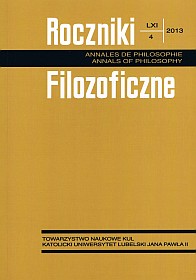The Centrality of Lived Experience in Wojtyla’s Account of the Person
Abstract
The aim of this paper is to illuminate the centrality of lived experience in Karol Wojytla’s account of the person and identify its significance for philosophy and praxis in the contemporary period. Specifically the author intends to pursue the meaning of Wojtyla’s claim that “the category of lived experience must have a place in anthropology and ethics—and somehow be at the center of their respective interpretations.” The paper seeks to recover an important insight into the task of philosophy: according to Karol Wojtyla, if philosophy is to perform its essential function in the recovery of our culture, we have no choice but to turn our attention to the subjectivity of human persons— and this can only be done by taking up the somewhat risky challenge of studying the reality of lived human experience. The paper will analyze Wojtyla’s argument that the problem of human subjectivity is at the epicenter of debates about the human person and will argue that his solution reconciles the dilemma posed by the historical antinomies that have characterized anthropology and epistemology, viz., the “objective” or ontological view of the human being and the “subjectivism” often associated with the philosophy of consciousness, and their corollaries, realism and idealism.
At least in the English speaking context, where the validity of individual experience has risen to the level of almost dogmatic significance for social and political life, Father Wojtyla’s claim appears either to have gone unnoticed or to have been rejected. And perhaps, at least on the surface, this is not without reason. The modern interest in human subjectivity is blamed for many contemporary maladies, including subjectivism, relativism and the pride of place now given to any individual point of view, no matter how ill informed. Claims about the existence of truth or an objective moral order often cannot find a foothold when confronted with the argument that such realities do not resonate with a particular individual’s personal “experience.” The priority given to subjective personal experience in determining what constitutes right thinking and moral human behavior, assuming that question is even asked, is now a commonplace assumption; it is something alternately deplored or celebrated both by intellectuals and the “man on the street.”
Given this situation, that a philosopher of Father Wojtyla’s stature and obvious moral authority should make such an argument is a matter of critical importance, especially for those who seek to ground human action in objective moral norms in an era where an arguably flawed account of human subjectivity clearly has taken center stage. The paper shows that Wojtyla is not adverting to experience as an adjunct to moral relativism or personal preference as an approach to questions of the true and the good. On the contrary, the author shows that the philosopher Karol Wojtyla provides a way to remain grounded in the metaphysical and ontological categories that not only comprise our intellectual heritage, but refer to real and profound truths, while simultaneously accounting for the subjectivity and dynamism of the person. The paper concludes with an argument that this account provides a key hermeneutical device for understanding the enormous importance of the work of Pope John Paul II.
References
Buttiglione, Rocco. Karol Wojtyla: The Thought of the Man Who Became John Paul II. Grand Rapids, MI: Eerdmans, 1997.
Crosby, John F. “Persona est sui iuris: Reflections on the Foundations of Karol Wojtyla’s Philosophy of the Person.” In Karol Wojtyla: Filosofo, Teologo, Poeta: Atti del I Colloquio internazionale del pensiero cristiano, Rome, September 23-25, 1983. Vatican City: Libreria Editrice Vaticana, 1984.
Dewan, Lawrence. “The Real Distinction between Intellect and Will.” In Wisdom, Law, and Virtue, 125-150. New York: Fordham University Press, 2008.
Galkowski, Jerzy W. “The Place of Thomism in the Anthropology of K. Wojtyla,” Angelicum 65 (1988).
Kupczak, Jaroslaw. Destined for Liberty: The Human Person in the Philosophy of Karol Wojtyla/ John Paul II. Washington, D.C.: Catholic University Press, 2000.
Marion, Jean Luc. “L’Autotranscendance de l’homme: Signe de contradiction dans La Pensée de Karol Wojtyla.” In Karol Wojtyla: Filosofo, Teologo, Poeta: Atti del I Colloquio internazionale del pensiero cristiano, Rome, September 23-25, 1983. Vatican City: Libreria Editrice Vaticana, 1984.
Montalbo, Melchor. “Karol Wojtyla’s Philosophy of the Acting Person.” Philippiniana Sacra, Vol. 23, 1966, 329-387.
Savage, Deborah. The Subjective Dimension of Human Work: The Conversion of the Acting Person According to Karol Wojtyla/John Paul II and Bernard Lonergan. New York: Peter Lang, 2008.
Schmitz, Kenneth. At the Center of the Human Drama. Washington, D.C.: Catholic University Press, 1993.
Smith, Janet. “Conscious Parenthood.” Nova et Vetera 6:4 (2008): 927-50.
Smith, Janet. “Natural Law and Personalism in Veritatis Splendor”. In John Paul II and Moral Theology: Readings in Moral Theology: No 10, ed. by Charles E. Curran and Richard A. McCormick, S.J., 67-84. Paulist Press, 1998.
Sokolowski, Robert. An Introduction to Phenomenology. New York: Cambridge University Press, 2007.
Szostek, Andrzej. “Karol Wojtyla’s View of the Human Person in the Light of the Experience of Morality.” ACPA, Volume 60, Existential Personalism, 50.
Veritatis Splendor: American Responses, ed. by Michael E. Allsopp and John J. O’Keefe. Kansas City, MO: Sheed and Ward, 1995.
Waldstein, Michael. Introduction to John Paul II, Man and Woman He Created Them: A Theology of the Body. Boston: Pauline Books, 2006.
Wojtyla, Karol. Person and Community. New York: Peter Lang, 1993.
Wojtyla, Karol. The Acting Person: A Contribution to Phenomenological Anthropology. Springer, Netherlands, 1979.
Copyright (c) 2013 Roczniki Filozoficzne

This work is licensed under a Creative Commons Attribution-NonCommercial-NoDerivatives 4.0 International License.





